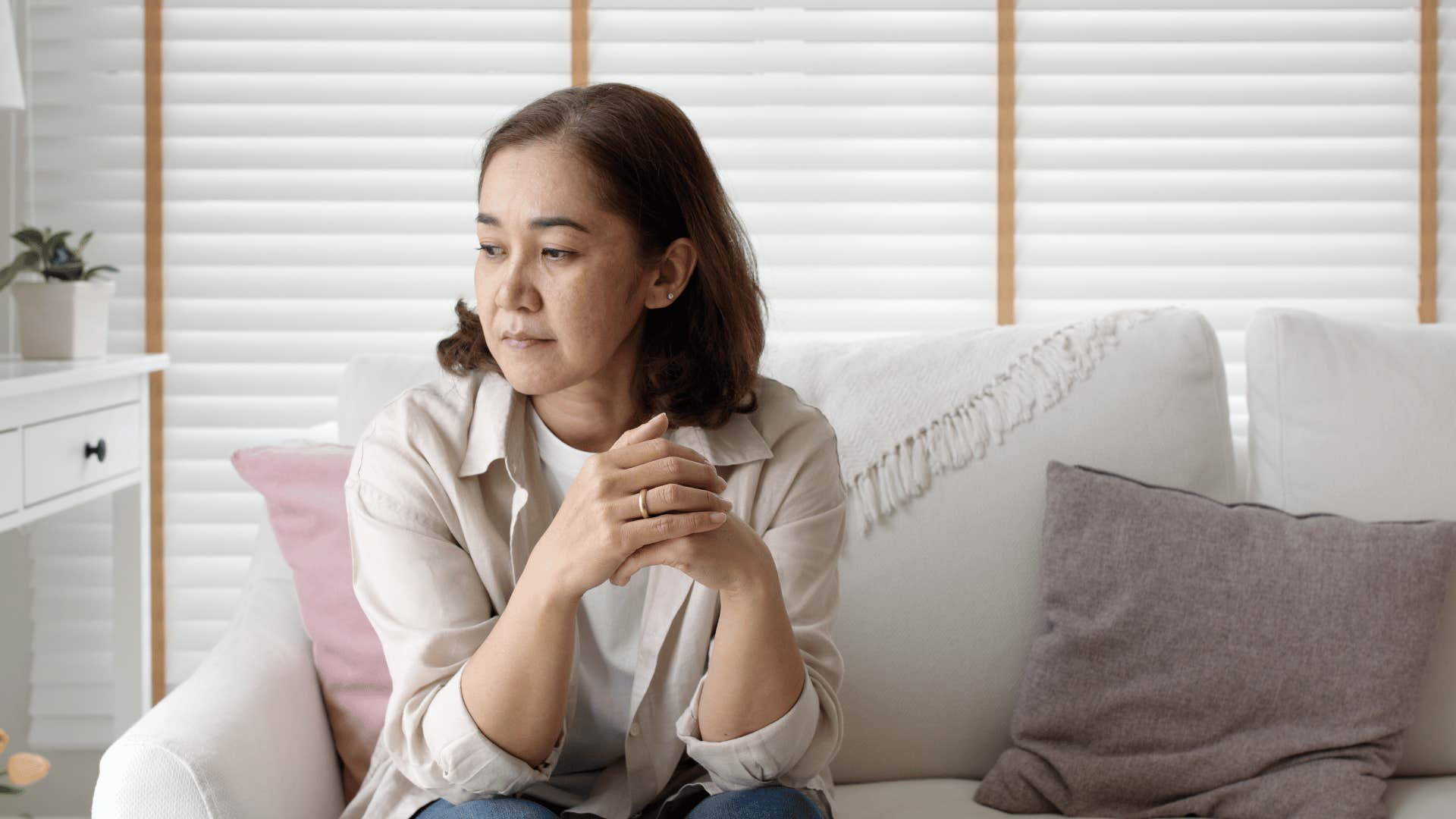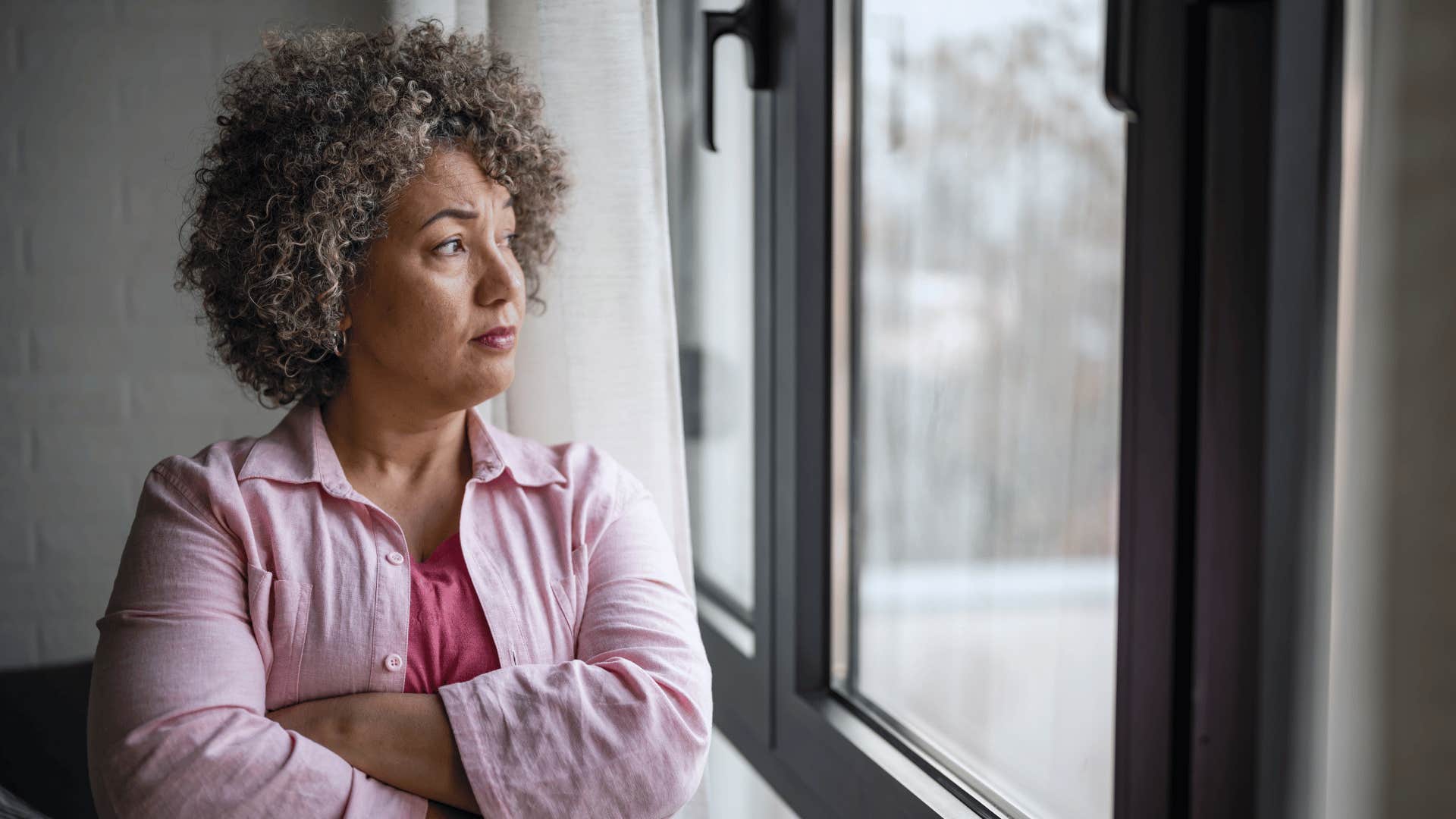12 Phrases Parents Don't Want To Hear From Their Adult Children
Parenting children isn't always smooth sailing, even when they grow up.
 Maria Sbytova | Shutterstock
Maria Sbytova | Shutterstock We tend to believe that relationships between parents and their children get easier with time. The narrative about raising kids makes it seem that toddlerhood and the teenage years are the most challenging stages, and reaching adulthood means smooth sailing. However, parents often struggle with their adult children, especially if their kids expect them to accommodate their every need despite being grown.
Misaligned expectations strain their relationship. Their sense of connection erodes, making parents feel emotionally distant. Their kids only call to ask for something, and the conversation is full of phrases parents don’t want to hear from their adult children.
Here are 12 phrases parents don’t want to hear from their adult children:
1. ‘You were never there for me when I was a kid’
 fizkes | Shutterstock
fizkes | Shutterstock
A phrase parents don’t want to hear from their adult children is, “You were never there for me when I was a kid.” Everyone is entitled to their own experience, yet when adult children tell their parents that they weren’t present or available when they were younger, parents hear, “You failed me.”
Parents who disagree with their adult children's interpretation of their upbringing should still listen and hold space for their kids’ feelings, even when it’s painful. Despite not seeing eye to eye, they can emotionally validate their adult children’s perspective. More often than not, being dismissive leads to even more hurt and heartache for both parents and their children.
A 2009 study in the Journal of Psychology and Aging examined how tension between parents and their adult children affected the quality and strength of their relationship.
Their findings were consistent with the “developmental schism hypothesis,” which states that having a tense parent-child relationship is common. They reported that the primary source of tension comes from discrepancies in developmental needs, which differ by generation, age, and gender.
In a separate study that same year, the researchers investigated strategies for navigating those tensions. The most constructive method was to address problems as they arise and work to understand and accept the other person’s perspective. Avoiding or arguing about issues only deteriorated their relationship further.
While it’s never easy for parents to hear that their children are disappointed in them, they should remember that they did their best with the tools they had at the time and give themselves grace.
2. ‘I can’t forgive you’
 fizkes | Shutterstock
fizkes | Shutterstock
Another phrase parents don’t want to hear from their adult children is “I can’t forgive you.” Apologizing for causing harm requires profound self-awareness and deep inner reflection. Saying sorry is an act of love and an attempt at healing, but just because a parent is ready to apologize doesn’t mean their adult children are prepared to forgive them.
Dr. Ramani Durvasula, a psychologist who specializes in healing from narcissistic relationships, shared her belief that forgiveness isn’t always the right answer. While we tend to think forgiving people who’ve hurt us is essential for moving on with our lives, Dr. Ramani noted that accepting an apology can often perpetuate someone’s pain.
“The pressure to forgive has led some people to feel guilty their whole lives [or] prematurely forgive,” she explained. “There's a really interesting body of literature out there that suggests that if we forgive someone who reperpetrates it significantly harms the well-being of the forgiver.”
“I think people who don't forgive definitely feel peace,” Dr. Ramani continued. “I think the people who don't feel peace are the people who forgive and keep getting harmed. Healing from narcissistic abuse is individuating, becoming autonomous, and ultimately rising into your authentic self. And your authentic self may not forgive.”
Parents don’t want to hear that their adult children don’t forgive them, yet they should recognize that they’re not owed forgiveness from their kids or anyone else. They can begin their healing journey once they accept that vital truth.
3. ‘I can’t afford to visit you this year’
 fizkes | Shutterstock
fizkes | Shutterstock
Parents don’t want to hear the phrase “I can’t afford to visit you this year” from their adult children. For many empty-nesters, their kids’ annual trip home is the most anticipated experience in their lives. They count down the days until they’ll see their kids again, so hearing that visiting is out of the question can cause severe despair.
It’s nearly impossible to separate economic concerns from family life when sending kids to preschool costs the same as college tuition, and buying enough groceries to keep your family fed can drain your bank account. The high cost of living means many people are figuring out how to have more frugal lives, leaving certain luxuries, like travel, off their lists.
While canceling a trip home isn’t ideal for parents or adult children, they can stay connected, even if they’re not sharing space. They can send “thinking of you” texts and schedule a talk. Parents can also send care packages and write letters, knowing their love can cross state lines and nourish their souls.
4. ‘I’m not happy with my life’
 Chay_Tee | Shutterstock
Chay_Tee | Shutterstock
A phrase parents don’t want to hear from their adult children is, “I’m not happy with my life.” It’s easy for parents to interpret this statement as an accusation: If only they’d been better parents, their kids would be happy. Yet that line of thinking traps people in a toxic dynamic because the truth is, we can’t rely on validation from others to make us happy. Everyone is responsible for their emotions, and it’s not a parent’s job to fix their children’s feelings.
As therapist Nancy Carbone explained, true happiness comes from breaking out of self-deprecating patterns and committing to habits that allow you to flourish.
“Remember that you deserve to be happy and do what is right for you,” she shared. “Ask yourself your goals and what is most important to you. Make time for yourself, take better care of yourself, and do the things that bring you joy.”
“Real happiness stems from having self-belief and feeling good enough about yourself,” Carbone continued. “This gives you the fuel to pick yourself up, embrace yourself, nurture yourself, and invest in yourself.”
“The real antidote to being truly happy within yourself is mastering self-love, believing in yourself, and focusing on yourself instead of finding happiness in other people,” she concluded.
5. ‘I don’t want you at my wedding’
 Lordn | Shutterstock
Lordn | Shutterstock
A phrase parents don’t want to hear from their adult children is, “I don’t want you at my wedding.” For most parents, watching their kids get married is a joyful, once-in-a-lifetime experience, second to having grandchildren. But not everyone has the fairytale version of family, which means they choose to go no-contact or low-contact with their parents.
Milestone events like weddings can exacerbate underlying tensions in any family, especially when parents and their children don’t have a close bond. The happiest day of someone’s life might be painful for their parents, as not being invited to celebrate with their child highlights the distance between them.
Parents can’t force their adult children to do anything they don’t want to do, even include them in their wedding. All parents can do is acknowledge how they feel and give themselves time to grieve because what they’re experiencing is a form of loss.
6. ‘You’re so judgmental, I can’t be myself with you’
 fizkes | Shutterstock
fizkes | Shutterstock
Parents don’t want to hear their adult children say, “You’re so judgmental; I can’t be myself with you.”
Being raised by judgmental parents directly affects one’s sense of self-worth, which often means one struggles to be one's most authentic self, especially around one's parents.
Parents might not consider themselves highly critical. Yet a study in the Journal of Psychology and Aging found that parents who place expectations on their adult children contribute to increased tension in their relationships.
The study found that parents expressed more ambivalence about the quality of their relationships with their adult children if their kids had not reached what they considered to be “adult statuses,” such as holding down a job, being financially stable, getting married, or having kids.
All parents want their children to succeed, yet their view of success might differ significantly from how their adult children define it. The best thing parents can do for their children, even once they’re grown, is to practice radical acceptance and let them chart their course through life.
7. ‘I don’t want you around my kids’
 fizkes | Shutterstock
fizkes | Shutterstock
A phrase parents don’t want to hear from their adult children is, “I don’t want you around my kids.” This phrase might shock parents and seem excessively harsh, but how parents show up for their kids when they’re young directly impacts their relationship later on, which sometimes means being cut off from their lives.
As hard as this sentiment might be for parents to accept, adult children have every right to decide whether their children want to know their grandparents. Parents don’t get an automatic pass to be in their grandchildren’s lives, especially if there’s unresolved trauma in their relationship with their adult children.
Adult children are allowed to determine who they want around their kids. When parents push back or question their rules, it shows they have big trouble with boundaries.
Therapist Eli Harwood revealed how this struggle often plays out: "When a grandparent continues to fixate on a topic or dynamic you have previously addressed, likely, they have not developed the skill of respecting boundaries.”
“We can tell someone can handle boundaries when they receive our feedback or limits with clear communication and changes in behavior,” she concluded. When parents aren’t willing to accept their adult children’s boundaries, it exacerbates tension and pushes them further away.
8. ‘I’m dropping out of school’
 fizkes | Shutterstock
fizkes | Shutterstock
A phrase parents don’t want to hear from their adult children is, “I’m dropping out of school.” Hearing this phrase strikes fear in a parent’s heart because they want their kids to enter adulthood with a solid education, economic stability, and career options, which they equate with a college degree.
Yet, kids don’t always need a college degree to succeed, especially in this climate, where higher education is astronomically expensive. Opportunities for technical training give kids access to high-paying blue-collar jobs.
On an episode of the “Getting Open” podcast, YourTango CEO Andrea Miller spoke with Hannah Maruyama, co-founder of Degree Free, a company “helping young adults build successful careers without a degree.”
“Based on your calculations, only 7.7% of people need degrees if they want to be a civil engineer, if they want to be a surgeon, if they want to be a doctor,” Miller said.
Maruyama believes that college isn’t the only path to financial stability and professional success, especially considering the crushing weight of student loan debt.
“The biggest way to move the needle forward is to keep kids out of student loan debt,” she said. “That will have a generational impact. I'm watching these kids, I'm watching all their potential, I’m watching them lose steam, I’m watching them not move forward because they’ve been told they can’t,” unless they have a college degree.
Parents might not like their decisions, but they must accept that their kids are the architects of their lives.
9. ‘I’m drowning in debt’
 fizkes | Shutterstock
fizkes | Shutterstock
Another phrase parents don’t want to hear from their adult children is “I’m drowning in debt.” Most parents see their role as guiding their kids to have successful lives, which includes meeting their own basic needs and building up a financial safety net. They don’t want to hear that their adult children struggle to support themselves or that their economic future is uncertain.
While being in debt carries a heavy amount of shame, it’s also the status quo for most adults in America. The average debt of a person in the U.S. is $104,215, including mortgages, car loans, student debt, and credit cards. Mortgages comprise the largest percentage of an average consumer’s debt balance, at $244,498.
Parents never stop worrying about their children, even when they’re adults. Hearing that their children are in debt causes them immense concern, even though it’s common.
10. ‘I need to move back home’
 Lewis Tse | Shutterstock
Lewis Tse | Shutterstock
A phrase parents don’t want to hear from their adult children is “I need to move back home,” yet more adults in the U.S. live with their parents now than in any previous generation.
Psychologist Dr. Laurence Steinberg spoke on the American Psychological Association’s podcast, touching on the reasons behind this cultural shift.
“The gap between housing costs and salaries has widened considerably, by about five times or so,” he said. “Young people need much more time to accumulate enough money to buy a home or even in some cities to rent an apartment on their own, making them economically dependent on their parents for much longer.”
Dr. Steinberg called for parents and their adult children to reframe their ideas about moving home, noting that it’s not so much a “failure to launch” as it reflects our world.
“Let’s first begin by asking both generations to understand and accept the fact that this is normal now in the United States,” he said, noting that “the key really is to have a conversation about what everybody’s expectations are because it’s a new situation… so they need to talk about what the rules are, what the guidelines are.”
Parents might not want to welcome their adult children back to the homes they were raised in, but for many people, moving home is the only way to keep their heads above water.
11. ‘I wish you raised me differently’
 fizkes | Shutterstock
fizkes | Shutterstock
A phrase parents don’t want to hear from their adult children is, “I wish you raised me differently.” For parents, this phrase implies that their kids had unhappy childhoods or that they’re being blamed for a past they can’t control.
Adult children have every right to their interpretations of their childhood, which often means expressing emotions that are hard for parents to accept.
Everyone lives with some amount of regret, both big and small. It’s not unhealthy to voice those regrets, but it is harmful to stay stuck in them. Moving on from the past isn’t simple, but letting go of things we can’t control is the only way to free ourselves from resentment and bitterness.
12. ‘I don’t feel loved by you’
 mojo cp | Shutterstock
mojo cp | Shutterstock
“I don’t feel loved by you” is a phrase parents don’t want to hear from their adult children. Not all parents are capable of being responsive to their kids’ emotional needs, which can lead to them developing an insecure attachment style. Kids who don’t feel loved by their parents often struggle to create healthy adult relationships. They have difficulty letting other people in and learning to love themselves.
An article in the "Encyclopedia of Applied Ethics” pointed out that parental love provides a foundation for children’s sense of self-worth. Feeling loved by their parents allows kids to appreciate the “gift of love,” which makes them well-adjusted adults.
There’s a crucial difference between conditional love, which is based on a child’s ability to meet their parents' standards, and parents who give their kids unconditional love and support.
“When parental love is as it should be, no child feels that she or he has to excel in some striking way to be the undisputed object of parental love,” the article explained. “Because parental love underwrites self-respect, such love is the basis for a child coming to have a proper valuing of the self.”
When parents love their children exactly as they are, without imposing impossible expectations, they create a safe, nourishing space for them to become their most authentic selves in adulthood.
Alexandra Blogier, MFA, is a staff writer who covers psychology, social issues, relationships, self-help topics, and human interest stories.

